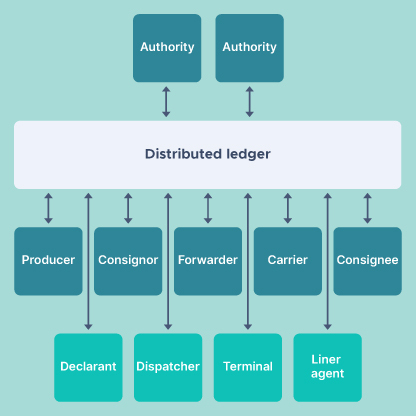Introduction
The Vision
Global trade and supply chains are highly complex and involve many actors – both public and private. Information is pushed between actors, re-keyed into new systems leading to loss of data integrity and authenticity. Paper documents, emails, phone calls and uncertainty are the daily details of moving goods.
The vision is a system where everyone can access trusted data from the source. The supply chain of the future is supported by blockchain technology (Distributed Ledger Technology). Original documents and events are reported in real-time and the latest status is always ready available to authorized actors. This way, organisations involved in a particular consignment have access to the original data instead of duplicated data in multiple siloed systems and everyone can see latest status, find original trade certificates etc. The project aims to make a number of public services digitally available such as trade certificates (Phytosanitary Certificate, Certificate of Origin, etc). It will make them easily accessible and ensure authenticity when shared with authorities in destination markets. The system also allows for sharing important information with other participants, such as: status of a consignment, consignment details, trader information, etc. The system uses encryption to ensure information is only shared with trusted and selected parties including customs at the destination market for quicker clearance processes.

Introducing TLIP
The TLIP portal is intended to provide an interface for users to consume the information stored within the TLIP system. It is not a replacement for existing systems, but a thin veneer which uses the TLIP API.
Actors in the logistics pipeline that don’t currently have visibility of consignment data will be able to use the portal to track the progress of their consignments. In addition, the actors who don’t currently have access to an integrated system should be able manage the data they are responsible for through the portal.
In some respects the portal should act as a demonstration of how to integrate the API into an application. There should be no logic or decision making in the portal code, all such code should live within the APIs so that any other system consuming them can expect the same behaviour and outcomes.
The objective of TLIP is to create a secure transaction layer for actors to share relevant data and trade certificates. Leveraging DLT/blockchain to ensure data integrity and trust between actors. This can create higher visibility across the trade journey for better management and planning. Also to ensure digital version of trade certificates are authenticated and cannot be forged to reduce the manual processes and documents
The Trade Logistics and Pipeline project will digitally connect border agencies with overseas customs and local traders for smarter and more efficient trade.

TradeMark East Africa is working with the East Africa Community in conjunction with the government agencies and private institutions involved in the export business to develop a regional and international information sharing platform. This initiative is largely geared towards integrating the regional and international stakeholders trading in goods. Since 2016, TMEA in partnership with Government Ministries, Agencies and Institutions involved in International Trade, Private Sector Associations and selected strategic business have been engaging in the design of an information sharing platform to support international trade. This concept is referred to as the Trade Logistics Information Pipeline (TLIP). The concept under development is now maturing and we are reaching out to involve more partners.